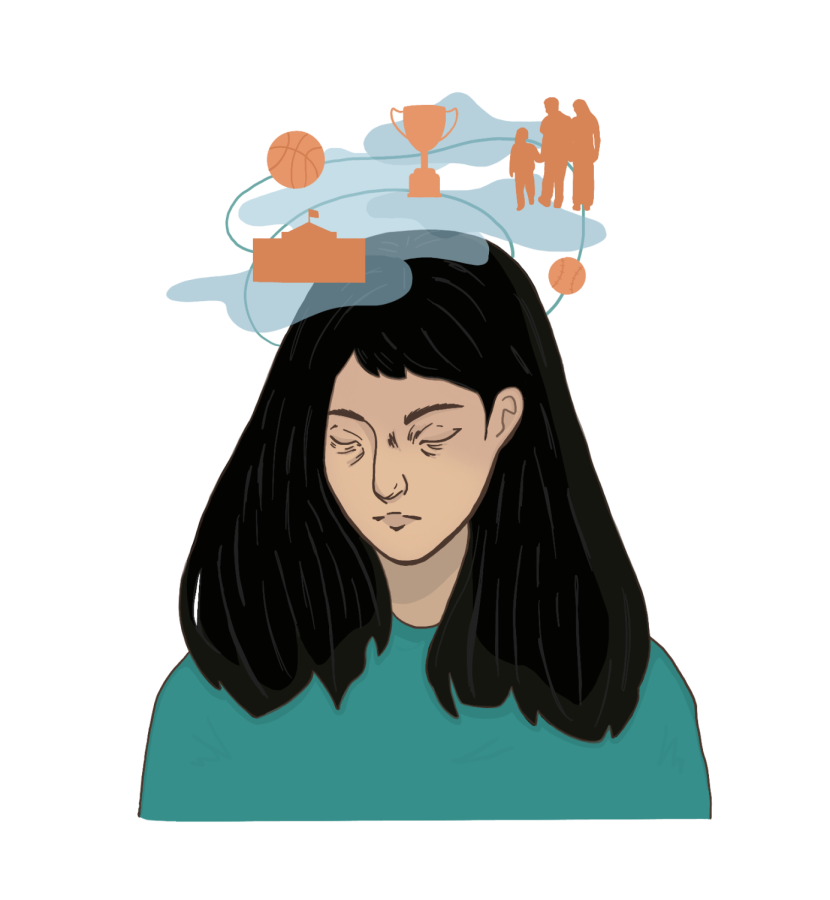A Quiet Crisis
Student athletes often struggle in silence when trying to balance the stress of school and the pressure to perform in their athletic activity
September 4, 2023
Being a student-athlete is no easy task. You are forced to balance your academics with your sport, which may involve missing school and putting sports ahead of school work. This stress can build up and cause some serious mental health issues for athletes.
Southeast students have expressed their concern with mental health issues related to sports and how it affects their all-around lifestyle. Mental health is often on the back-burner, as students’ performance in school and sports is more important. That being said, athletes still love their sports and want to perform to the best of their abilities for their parents, coaches and teammates.
“I think there are times when there’s burnout, but once again, just remembering why I’m doing it and why I started in the first place kind of just keeps me going,” sophomore tennis player Carolyn Skold said.
Although their mental health is affected by the sports they play, athletes still love the game they play and the people they play them with. It seems that athletes always want to perform at a higher level to help their team win. They don’t want to be the reason that their teammates and coaches are down at the end of the game so that can provide some mental stress as well.
“Since I’m committed to swim in college, there’s a lot of expectations on me from my parents but especially from my coaches and teammates. I have a lot of expectations for myself,” senior Emily Maw said.
The stress of high expectations is definitely one of the biggest stressors for athletes. Besides that, the stress of the game in itself is enough to cause mental health issues. For example, wrestlers always have to be concerned with their weight. If a wrestler doesn’t make weight, they won’t be able to wrestle and it could impact the team as a whole.
“I constantly have to know what I’m eating and it feels like a lot of pressure to make sure you’re at that weight,” sophomore Lucas Davis said.
This alone can cause many mental health issues and even eating disorders or body dysmorphia.
The amount of time, dedication and effort needed for sports is astronomical and can vary from 12 to 30 hours per week depending on the sport, and athletes still have to have time to fit in school work, other extracurriculars and even a job in some instances. This leaves no room for anything else for a high school athlete to do. They have to finish school work, compete and practice;that’s their daily routine without any change until the season is over.
“I do club year round and it’s kind of draining but during the school season it’s honestly really hard to deal with because I feel like I’m just in a cycle doing the same thing every single day just like waking up, going to school, going to swim after, then going home and sleeping and then I wake up and do it again. It kind of feels like it takes up all my time and I still love it. But at the same time it’s kind of hard to deal with,” Maw said.
Another example of mental health affecting a whole community is with the Nebraska softball community. Recently, mental health has become a real issue in this community and has caused lots of stress for players and parents.
“There’s been a lot of mental health issues so coaches have definitely started to get better at checking in with their players,” freshman softball player Sydney Kjeldgaard said.
In addition to the pressure student athletes put on themselves, they feel the pressure from their parents as well .
Sophomore Josh Filliez says his dad “pushes him as hard as he can go” and expects him to perform at a high level. Filliez wants his father to be proud of him so he is constantly putting in work behind the scenes to work on his game and live up to the high expectations of his dad.
This seems to be a recurring theme among athletes, that they must live up to these high expectations that someone is making for them, which is an ultimate factor of mental health issues and stress.
According to Maw, she expresses her concerns with coaches not taking mental health as seriously as they should. Maw says that in reality, most athletes struggle with mental health issues but don’t feel comfortable sharing with their coaches due to their views. Another aspect that is difficult for athletes to grasp is balancing a complete school life as well as an athletic life.
“I think sometimes it’s really hard to balance it. Honestly, a lot of the times I ended up just not doing any of my work because I was just always so busy and I just felt like I didn’t have any time and then I would end up having to do all of my assignments in like one night right before they’re due. And that’s really stressful,” Maw said.
Luckily for athletes, teammates can be very supportive of their endeavors and try to take them under their wing to help train them to the best of their abilities. This is one of the positive effects of sports because it gives you bonds that will last a lifetime. Athletics is a mental game as much as it is a physical game and the teammates help cool any mental worries a player may have before a stressful competition.
“Another good thing with mental health in sports is that your teammates are in the same situation. They’re doing the same thing and they’re always there for you,” Kjeldgaard said.
This is just a glimpse of the impact on how sports affect athlete’s mental health and provide extra unneeded stress in their lives. Athletes shouldn’t be afraid to tell someone about the mental health issues they have due to their sport. Mental health has always been an issue and now it’s affecting athletes as young as middle school. This is a serious problem. Don’t be afraid to tell someone what you’re going through. If you or someone you know is experiencing mental health issues and not telling anyone suggest a therapist or calling the national suicide helpline (988).









